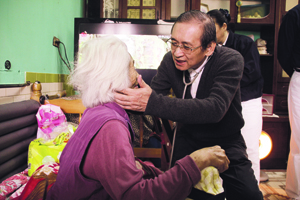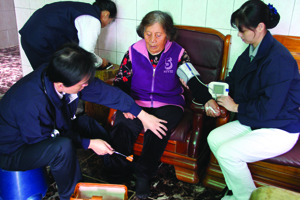

| The Gentle Hands of a Doctor: Soothing the Old and the Young | ||||
| By Zhang Jing-mei Translated by Tang Yau-yang Photos by Chen Yu-yan | ||||
Every Patient Counts Dr. Wu San-jiang calls on medical care professionals to join him in taking free medical services to remote mountain villages in Kaohsiung. Most of the patients he treats there share two characteristics: They are elderly and they are sick. He delivers tender loving care to these folks, hoping to help rekindle their joy in living.
A grocery store stood on one side of a quiet road in Jianshan, a mountain community in Taoyuan District, Kaohsiung, southern Taiwan. No shoppers were in sight; the only thing that livened up the scene was a bougainvillea plant in full bloom, its red flowers showing off their vibrant color under the spring sun. Inside, the store was crowded with snacks and agricultural implements. An old dog lay indolently on the floor. Suddenly, the quiet was broken by the patter of approaching footsteps. The dog pricked up its ears. A small group of people came into the store. They called out, “Mr. Wang, we’ve come to see you. How have you been lately?” An old man sitting in the store opened his eyes, looked at the visitors, and nodded without saying anything. The group of people was a familiar sight to him. They visited the community once a month to provide medical checkups for elderly folks in the village, and he was one of their regular patients. After checking Mr. Wang out, Dr. Wu San-jiang (吳三江) reported, “Your blood pressure is good and your blood sugar normal, your breathing is smooth, pulse steady. You’re in great shape. How old are you, sir?” “I’ll be a hundred in three months,” he replied. The old man was not only in good health—he had a very clear head, too. He still managed every aspect of the store. The dog suddenly rose from where he lay as a domestic helper pushed Mrs. Wang in a wheelchair from the back of the house into the store. She had suffered from a stroke, so her head drooped. Tzu Chi volunteer Wang Xiu-chuan (王琇釧) patiently showed her some rehabilitation exercises to strengthen her hands. “Her blood sugar is 293. That’s way too high,” a nurse exclaimed. Pharmacist Yang Zhu-mao (楊竹茂) checked Mrs. Wang’s medications. They were the correct meds, and she had been on them regularly, but Yang knew what to ask: “What did you just eat?” Mrs. Wang squeezed out a few halting words: “Her…bal tea…all…na…tural.” It turned out that Mrs. Wang had just had some bottled tea. Dr. Wu said, “Mrs. Wang, that beverage has added sugar, even if it’s made from natural ingredients. You shouldn’t be drinking it.” To make sure his message got across, he repeated his words until the old woman no longer looked blank and nodded in understanding. Reassured, the group of volunteers said good-bye to the Wangs and moved on to their next stop.
Swollen knuckles Mrs. Gao, 88, was sitting under the eaves of her house when the group arrived. Dr. Wu started talking to her in Japanese. [Many old people in Taiwan grew up while Taiwan was under Japanese rule, from 1895 to 1945.] The two of them had a conversation that the others did not understand. Some of the others knew a few simple Japanese phrases, so they put in a word here or there to amuse Mrs. Gao. After a while, a neighbor came over and told them, “Hey, she knows Taiwanese [a widely used dialect]!” Everybody burst out laughing. Amidst the laughter, Mrs. Gao herself said, “I speak Mandarin, too.” All the while, Yang, the pharmacist, was carefully checking the medicines in Mrs. Gao’s possession. The old woman had needed to see several specialists for her various ailments, and Yang wanted to make sure that those medications did not overlap or interfere with one another. After bidding goodbye to Mrs. Gao, the group visited Mr. Yan’s home. Bedridden due to a stroke, Yan was lying in bed watching Tzu Chi’s Da Ai TV when the volunteers entered his house. “You knew we were coming, so you tuned to Da Ai TV, didn’t you?” they teased him. He hurried to defend himself. “No, no. I watch it every day. I like watching it. People helping people is good.” Dr. Wu held Yan’s hand and said, “Right, we were just teasing you. Now let me check your blood pressure.” As the doctor got ready to do that, his attention was caught by something else. He looked closely at the man’s fingers, each joint showing an obvious bulge. “Do you know what these bumps are?” Wu asked Yan. “They’re a symptom of gout. Have you ever had your uric acid checked?” Yan shook his head. Pharmacist Yang checked the old man’s medications and told the doctor there was no gout medicine among them. The doctor was worried. “If not treated, gout can cause problems in the kidneys and other organs. This is serious.” The air turned gloomy. The grave expressions on the faces of those around him prompted Yan to comfort them. He said, “My wife is taking me down the mountains tomorrow for a doctor’s appointment. I’ll ask the doctor to run a blood test on me.” That helped put the volunteers at ease, but they still reiterated the necessity of having his uric acid checked. “Thank you,” Yan said to the volunteers. “May the Lord be with you.” After some more small talk, the group left for their next visit. Even after they were out of the house, they could still hear the cheerful Yan calling out repeatedly, “May the Lord be with you.”
Home alone Next they visited Mrs. Wen. As they got close to her house, mountain breezes carried wave after wave of stench to them. Mrs. Wen was blind in one eye, and she had been immobile since fracturing a thigh bone in a recent fall. The accident had left her unable to do things for herself. She had to wear a diaper and lie in bed all day long. She was entirely isolated during the day when her family went to work. When she felt bored, she turned on the TV; when she felt like talking to someone, she talked to the rag doll on her bed. The volunteers surrounded the old woman. Despite the inescapable smell, they chatted with her as if the odor were not there. Taking this all in, Dr. Wu felt warm inside. He looked back on his own life, especially his medical career, which he had entered with lofty aspirations. His idealism, however, had been chipped away bit by bit as he experienced the trials of work and life. Though he earned himself a good reputation as a physician, he knew deep down that his passion for medical care was dissipating. His waning enthusiasm only started to pick up when he joined the Tzu Chi International Medical Association (TIMA). Through one free clinic after another, one house call after another, he gradually regained his sense of mission as a physician. Off to one side, Yang was checking Mrs. Wen’s medications; he did not see any pain and blood pressure medicines, which were what she needed the most. Looking at the old woman’s gloomy face, Yang could feel his own eyes growing moist. Dr. Wu quickly wrote a prescription for her. At lunch time, volunteer Chen Teng-wei (陳騰崴) drove Yang to the pharmacy at a free clinic taking place at Baolai Elementary School and got the prescription filled there. They also packed a boxed lunch for Mrs. Wen. Then the two of them rushed back and gave her the meal and the medicine.
The house calls and the free clinic at the elementary school that day ended at two o’clock. All the volunteers gathered at the school afterwards to share their thoughts for the day. Yang talked about a few elderly patients that his team had visited that day. He could not help crying as he recalled their loneliness and need for care. Tears also filled the eyes of Dr. Ye Tian-hao (葉添浩) as he listened to Yang. He felt for those old folks as well. At the same time, he was grateful that the free clinic had gone as scheduled. He was the leader of the free clinic team this time, and heavy rain the night before had really worried him. Like all the other volunteers, he did not want the event to be rained out. He had tried to reassure himself the previous evening: “This is a good thing. Heaven will give us many blessings.” Just as he had hoped, everything turned out well. Dr. Wu San-jiang started working with TIMA free clinics in 2003. He has seen for himself the dearth of medical resources in the mountains and the inadequacy of medical knowledge among the people there. He knows he has no magic wand to take away the misery of all those elderly people, but he reminds himself that he can at least make the situation better for one person at a time. He gave the example of a Mrs. Zeng, a 73-year-old Taiwanese aborigine who was suffering from Parkinson’s disease, high blood pressure, and severe diabetes. Her family had hired a woman who had taken very good care of her. However, they themselves could not spend much time with her, and the helper could not speak Mrs. Zeng’s tribal tongue. The old woman was therefore quite lonely. Often she would say nothing all day long except when her next-door neighbor, Mrs. Chen, came over. The two of them would chat in their native Bunun language. Wu said, “Sometimes they just need some care from people.” After having served people like Mrs. Weng and Mrs. Zeng in medical outreach missions for ten years, Wu feels a need for more medical professionals to join TIMA so that more underserved people can get the personal attention and good health care they need. He hopes that together they can give old people in the mountains some warmth and help them enjoy their later years more. |















|


